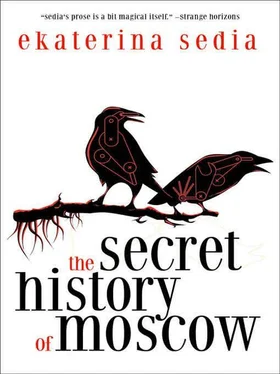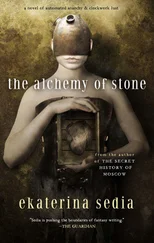It was strange being out of the office during the day, and she walked across Tverskaya teeming with tourists, and let her feet meander until she found herself on Herzen Street. Old like everything in this part of the city, the street was lined with old stone buildings, and Galina stood a while, trying to remember that one house she used to love as a teenager. She spotted the three-storied brownstone, and prayed that the tenants hadn't installed the security lock at the entrance.
They hadn't, and she ran up the stairs, guilty and quiet on her feet. She hoped that none of the tenants would emerge from their comfortable, expensive apartments with steel security doors and question her right to be here.
This stairwell was one of her treasures, one of the secrets nobody knew about-she collected them obsessively, and reveled in the knowledge of her riches. Few of them were tangible-a convex piece of green bottle glass, buried in a sandbox with a perfect autumn leaf and a dried daisy underneath it, so one could unearth it slowly, grain by grain, and revel in the miraculous crystalline beauty; others were less so-a hidden eddy on the river, a particular angle at which sunlight struck the gilded onion of a church, and that house on Herzen Street, which had an unguarded roof exit, where one could sit on the slanted metal roof, warm from the sun, and be in awe of the old city curled in a cradling embrace of the river.
There was no one else on the roof, nor had there been in all the years she came here. There was trash by the chimney, and she surmised that others came here too; perhaps some of the beggars in the underground tunnel slept here, away from the stray dogs and police patrols in the streets. She rested her back against the chimney and pressed her toes against the gutter, lest she slid off the steep incline, and looked.
There is a reason they call it the city of forty times forty churches. Splashes of gold dotted the landscape before her, unobscured by the tall modern buildings. Yellow of the poplars and gold of the churches and blue of the sky made her sigh happily, forgetting for a moment her acute misery. Then she noticed a dark cloud in the sky, and shielded her eyes from the sun. The cloud grew larger and closer, and Galina realized that it was composed of birds-jackdaws, crows, owls. Owls? She stared up at the soft soundless beats of softly feathered wings, and round yellow eyes stared back. The birds circled over her head and one of the jackdaws kept dipping lower, its wings almost brushing against her face, the wind of their beats ruffling her hair.
"What do you want?” Galina asked. There was no one around who would care that she talked to birds, who would decide to send her back. Alone, she did not have to fake normality.
The jackdaw landed on the edge of the gutter, tilting its head.
Masha, she wanted to say, but bit the word back. She might be ill, but she knew well enough to recognize a hallucination. Birds appearing out of nowhere and trying to talk to her, owls not at all bothered by the sunlight-it wasn't true, it wasn't happening to her. A good schizophrenic-a brave schizophrenic-knew that she was ill and that things that she saw were not necessarily there. A good schizophrenic should ignore a hallucination once she recognized it as such.
"Go away,” she whispered fiercely. “You do not exist, so leave me alone."
Her spirit in shambles, she rose and headed back to the hatch that would take her back to the world below. The birds grew agitated at her departure, and all of them drew closer, their wings raising a wind so strong she almost lost her footing. They mobbed her like the crows mobbed the cats who got too close to their nests, diving low, their claws pulling at her hair, their beaks opened wide. She fled to the safety of the hatch, her sneakers slipping on the suddenly too-smooth and dangerous metal. She grabbed at the boards framing the black square opening of her exit, splinters lodged in the weeping wounds on her fingertips, panicky, half-blinded by the black-and-gray movement in the air. She pulled herself into the dusty attic and ran for the stairs, the cawing and hooting finally left behind.
Too shaken to return to work, she walked along the New Arbat, recently converted to pedestrian traffic only and taken over by street artists. She looked as she passed; most exhibited landscapes of the city around them. She recognized the features as one would the corpse of a loved one-with features devoid of sparkling life and motion. Sketch artists called out to her, offering to draw her portrait, but she shook her head and watched the neat rectangles of the pavement. She passed several artisans exhibiting matryoshkas and painted jewelry boxes, imitating, more or less successfully, the traditional Palekh and Gzhel art. Several tourists haggled over the prices via their interpreter, and Galina shot the hassled man speaking in two languages at once a sympathetic look. She could never do that, she thought, to work for those people who descended upon the city like a plague-demanding, condescending, rude. But she wondered what it would be like, to believe that the world was created just for your pleasure and amusement.
She looked away, and stopped. A large painting propped against a storefront caught her eye and she stared at it, willing it to disappear. But it remained, the only painting that captured the spirit of its subject-the view from the roof she had just left, dotted with fat vivid strokes of gold and yellow, capped by a pale blue expanse of the sky. Worse, several birds, all beaks and claws, hung menacingly in the empty vastness of the sky.
The artist slouched by the painting, a dead cigarette in his slack lips. He eyed Galina with indifference and detached himself from the storefront. Unshaven, red-eyed, dirty. “Are you going to buy it?” he said.
Galina shook her head. “Sorry, no. But these birds… Can you see them too?"
The artist smiled, the stubble on his concave cheeks bristling. “Since last Friday. How about that! I thought it was the DTs."
Galina smiled. Great, she thought, a schizophrenic and an alcoholic saw creepy birds together. “Have you seen the owls?"
"Since Sunday,” he confirmed.
"Where did they come from? Why are they here, now, during the day?"
The artist stretched and yawned, blasting Galina with the stench of stale smoke and alcohol. “Who the fuck knows?” he said philosophically. “But if you want my opinion, it's probably the gypsies’ fault."
"Gypsies?"
"Or some other damn magic,” he conceded. “If you really want to know, come by some other day, after it gets dark, and I'll show you."
"My sister's missing,” Galina said. “I think it has something to do with the birds. Can't you explain now?"
"There ain't no explaining it,” he said. “And I can't show you until it's dark."
He spat out his cigarette, shoved his hands into his pockets, and indicated that he wasn't going to say anything else.
Galina sighed, and turned to leave. “I'm Galina,” she said in the way of goodbye. “I'll see you tomorrow."
"See that you do.” He gave a short nod. “Fyodor, that's my name."
Yakov never liked the way he looked-he seemed too prosaic, with not even a whiff of the Englishness he expected himself to possess. But from every spare line of his small square body to the last bristling hair on his head his appearance screamed ‘Russian peasant’ at the world. The world acted indignant in response and shoved him away. Moscow was especially violent in regards of shoving.
"Limitchik,” that's what they called people like him-housing in Moscow had always been for the native Muscovites, and a limited number of out-of-towners. Native Muscovites viewed the out-of-towners with condescension and contempt that surprised Yakov when he moved here, all of ten years old. Twenty years later, the hatred did not seem to lessen. He started to suspect that he would never grow into a native.
Читать дальше












